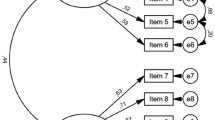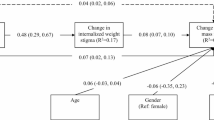Abstract
Weight stigma plays a damaging role in the life of the individuals with overweight and obesity who may internalise the widespread stigmatisation messages. Weight self-stigma is defined as personal experiences of shame, negative self-evaluations as well as perceived discrimination. It has been found to be related to experiential avoidance patterns and poorer outcomes. The current study aims to conduct a confirmatory factor analysis (CFA) on the Weight Self-Stigma Questionnaire (WSSQ) and explore its psychometric properties. Furthermore, the mediator role of weight-related experiential avoidance on the relationship between weight self-stigma and unhealthy eating behaviour was analysed. Concerning the CFA, the sample comprised 331 women with overweight and obesity seeking nutritional treatment. A second independent sample of 58 overweight and obese women was used to assess WSSQ’s temporal validity and internal responsiveness. Results supported the WSSQ two-factor structure and good psychometric properties and responsiveness to change. Also, evidence was found for the mediator role of weight-related experiential avoidance on the relationship between BMI, weight self-stigma and unhealthy eating patterns in women with overweight and obesity. Overall, the current study showed that WSSQ is a reliable measure and highlights the important role of weight self-stigma and weight-related experiential avoidance in women with overweight and obesity.
Level of evidence: Level V, descriptive studies.


Similar content being viewed by others
References
Andreyeva T, Puhl RM, Brownell KD (2008) Changes in perceived weight discrimination among Americans, 1995–1996 through 2004–2006. Obesity 16:1129–1134. https://doi.org/10.1038/oby.2008.35
Lillis J, Luoma J, Levin M, Hayes S (2010) Measuring weight self-stigma: the weight self-Stigma Questionnaire. Obesity 18(5):971–976. https://doi.org/10.1038/oby.2009.353
Link BG, Phelan JC (2001) Conceptualizing stigma. Annu Rev 27:363–385. https://doi.org/10.1146/annurev.soc.27.1.363
Puhl RM, Heuer CA (2009) The stigma of obesity: a review and update. Obesity 17:941–964. https://doi.org/10.1038/oby.2008.636
Nolan LJ, Eshleman A (2016) Paved with good intentions: paradoxical eating responses to weight stigma. Appetite 102:15–24. https://doi.org/10.1016/j.appet.2016.01.027
Vartanian LR, Porter AM (2016) Weight stigma and eating behavior: a review of the literature. Appetite 102:3–14. https://doi.org/10.1016/j.appet.2016.01.034
Latner JD, Ebneter DS, O’Brien KS (2012) Residual obesity stigma: an experimental investigation of bias against obese and lean targets differing in weight-loss history. Obesity 20(10):2035–2038. https://doi.org/10.1038/oby.2012.55
Hilbert A, Braehler E, Haeuser W, Zenger M (2013) Weight Bias Internalization, core self-evaluation, and health in overweight and obese persons. Obesity 22(1):79–85. https://doi.org/10.1002/oby.20561
Tylka TL, Annunziato RA, Burgard D, Daníelsdóttir S, Shuman E, Davis C, Calogero RM (2014) The weight-inclusive versus weight-normative approach to health: evaluating the evidence for prioritizing well-being over weight loss. Journal of Obesity 2014:1–18. https://doi.org/10.1155/2014/983495
Carels RA, Burmeister JM, Koball AM, Oehlhof MW, Hinman N, LeRoy M, Gumble A (2014) A randomized trial comparing two approaches to weight loss: differences in weight loss maintenance. J Health Psychol 19:296–311. https://doi.org/10.1177/1359105312470156
Durso LE, Latner JD (2008) Understanding self-directed stigma: development of the weight bias internalization scale. Obes J 16(2):80–86. https://doi.org/10.1038/oby.2008.448
O’Brien KS, Latner JD, Puhl RM, Vartanian LR, Giles C, Griva K, Carter A (2016) The relationship between weight stigma and eating behavior is explained by weight bias internalization and psychological distress. Appetite https://doi.org/10.1016/j.appet.2016.02.032
Ratcliffe D, Ellison N (2015) Obesity and internalized weight stigma: a formulation model for an emerging psychological problem. Behav Cognit Psychother 43(02):239–252. https://doi.org/10.1017/S1352465813000763
Pearl RL, White MA, Grilo CM (2014) Weight bias internalization, depression, and self-reported health among overweight binge-eating disorder patients. Obesity 22(5):E142–E148. https://doi.org/10.1002/oby.20617
Latner JD, Durso LE, Mond JM (2013) Health and health-related quality-of-life among treatment-seeking overweight and obese adults: associations with internalized weight bias. J Eat Disord. https://doi.org/10.1186/2050-2974-1-3
Farhangi MA, Emam-Alizadeh M, Hamedi F, Jahangiry L (2016) Weight self-stigma and its association with quality of life and psychological distress among overweight and obese women. Eat Weight Disord. https://doi.org/10.1007/s40519-016-0288-2
Palmeira L, Pinto-Gouveia J, Cunha M, Carvalho S. Finding the link between internalized weight-stigma and binge eating behaviors in Portuguese adult women with overweight and obesity: the mediator role of self-criticism and self-reassurance. Eat Behav 26:50–54. https://doi.org/10.1016/j.eatbeh.2017.01.006
Magallares A, Bolanos-Rios P, Ruiz-Prieto I, Benito de Valle P, Irles JA, Jauregui-Lobera I (2017) The mediational effect of weight self-stigma in the relationship between blatant and subtle discrimination and depression and anxiety. Span J Psychol 20:E4. https://doi.org/10.1017/sjp.2017.1
Puhl RM, Moss-Racusin CA, Schwartz MB (2007) Internalization of weight bias: Implications for binge eating and emotional well-being. Obesity 15:19–23
Hain B, Langer L, Hunnemeyer K, Rudofsky G, Zech U, Wild B (2015) Translation and validation of the German version of the Weight Self-Stigma Questionnaire (WSSQ). Obes Surg 25(4):750–753. https://doi.org/10.1007/s11695-015-1598-6
Maiano C, Aime A, Lepage G, Team A, Morin AJ (2017) Psychometric properties of the Weight Self-Stigma Questionnaire (WSSQ) among a sample of overweight/obese French-speaking adolescents. Eat Weight Disord. https://doi.org/10.1007/s40519-017-0382-0
Durso LE, Latner JD, White MA, Masheb RM, Blomquist KK, Morgan PT, Grilo CM (2012) Internalized weight bias in obese patients with binge-eating disorder: associations with eating disturbances and psychological functioning. Int J Eat Disord 45(3):423–427. https://doi.org/10.1002/eat.20933
Lillis J, Hayes SC (2008) Measuring avoidance and inflexibility in weight related problems. Int J Behav Consult Therap 4(4):348–354
Palmeira L, Cunha M, Pinto-Gouveia J, Carvalho S, Lillis J (2016) New developments in the assessment of weight-related psychological inflexibility (AAQW-Revised). J Context Behav Sci 5(3):193–200. https://doi.org/10.1016/j.jcbs.2016.06.001
Lillis J, Levin ME, Hayes SC (2011) Exploring the relationship between BMI and health-related quality-of-life: a pilot study of the impact of weight self-stigma and experiential avoidance. J Health Psychol 16:722–727. https://doi.org/10.1177/1359105310388321
Webb JB, Hardin AS (2016) An integrative affect regulation process model of internalized weight bias and intuitive eating in college women. Appetite 102:60–69. https://doi.org/10.1016/j.appet.2016.02.024
Palmeira L, Cunha M, Pinto-Gouveia J (2016) The role of weight self-stigma on the quality of life of women with overweight and obesity: a multi-group comparison between binge eaters and non-binge eaters. Appetite 105:782–789. https://doi.org/10.1016/j.appet.2016.07.015
Leehr EJ, Krohmer K, Schag K, Dresler T, Zipfel S, Giel KE (2015) Emotion regulation model in binge eating disorder and obesity—a systematic review. Neurosci Biobehav Rev 49:125–134. https://doi.org/10.1016/j.neubiorev.2014.12.008
Palmeira L, Pinto-Gouveia J, Cunha M (2016) Exploring the efficacy of an acceptance, mindfulness and compassionate-based group intervention for women struggling with their weight (Kg-Free): a randomized controlled trial. Appetite 112:107–116. https://doi.org/10.1016/j.appet.2017.01.027
Hambleton RK, Merenda PF, Spielberger CD (2005) Adapting educational and psychological tests for cross-cultural assessment. Lawrence Earlbaum Associates, Inc, New Jersey
Karlsson J, Persson LO, Sjöström L, Sullivan M (2000) Psychometric properties and factor structure of the Three-Factor Eating Questionnaire (TFEQ) in obese men and women. Results from the Swedish Obese Subjects (SOS) study. Int J Obes Relat Metab Disord 24(12):1715–1725
Palmeira L, Garcia T, Pinto-Gouveia J, Cunha M (2016) The revised Portuguese version of the Three-Factor Eating Questionnaire: a confirmatory factor analysis. In: Proceedings of the 3rd IPLeiria’s International Health Congress. BMC Health Services Research, 16:200
Gormally J, Black S, Daston S, Rardin D (1982) The assessment of binge-eating severity among obese persons. Addict Behav 7:47–55. https://doi.org/10.1016/0306-4603(82)90024-7
Duarte C, Pinto-Gouveia J, Ferreira C (2015) Expanding binge-eating assessment: validity and screening value of the Binge-eating Scale in women from the general population. Eat Behav 18:41–47. https://doi.org/10.1016/j.eatbeh.2015.03.007
Mannucci E, Ricca V, Barciulli E, Di Bernardo M, Travaglini R, Cabras PL, Rotella CM (1999) Quality-of-life and overweight: the obesity related well-being (Orwell-97) questionnaire. Addict Behav 24(3):345–357. https://doi.org/10.1016/S0306-4603(98)00055-0
Silva I, Pais-Ribeiro J, Cardoso H (2008) Contributo para a adaptação portuguesa de uma escala de avaliação da qualidade de vida específica para doentes com obesidade: a Orwell-97. Psicologia Saúde Doenças 9(1):29–48
Lyubomirsky S, Lepper HS (1999) A measure of subjective happiness: preliminary reliability and construct validation. Soc Indic Res 46(2):137–155. https://doi.org/10.1023/A:1006824100041
Pais-Ribeiro J (2012) Validação transcultural da escala de felicidade subjectiva de Lyubomirsky e Lepper. Psicologia saúde doenças 13(2):157–168
Flora DB, Curran PJ (2004) An empirical evaluation of alternative methods of estimation for confirmatory factor analysis with ordinal data. Psychol Methods 9:466–491. https://doi.org/10.1037/1082-989X.9.4.466
Muthén B, du Toit SHC, Spisic D (1997) Robust inference using weighted least squares and quadratic estimating equations in latent variable modeling with categorical and continuous outcomes. Psychometrika 75(1):1–45
Hsu HY (2009) Testing the effectiveness of various commonly used fit indices for detecting misspecifications in multilevel structural equation models. Doctoral dissertation, Texas A&M University
Hu L, Bentler PM (1998) Fit indices in covariance structure modeling: sensitivity to underparameterized model misspecification. Psychol Methods 3:424–453
Kline RB (2005) Principles and practice of structural equation modeling, 2nd edn. New York, Guilford
Yu CY (2002) Evaluation of model fit indices for latent variable models with categorical and continuous outcomes. Unpublished dissertation. Retrieved 18 January from Mplus website http://www.statmodel.com/download/Yudissertation.pdf
Hair J, Anderson R, Tatham R, Black W (1998) Multivariate data analysis. Upper Saddle River, Prentice Hall, NJ
Dimitrov DM (2010) Testing for factorial invariance in the context of construct validation. Measur Evaluat Counsel Dev 43(2):121–149
Tabachnick B, Fidell L (2007) Using multivariate statistics. Pearson Education Inc., New York
Cohen J, Cohen P, West SG, Aiken LS (2003) Applied multiple regression/correlation analysis for the behavioral sciences, 3rd edn. Lawrence Erlbaum Associates, Mahwah, New Jersey
Husted JA, Cook RJ, Farewell VT, Gladman DD (2000) Methods for assessing responsiveness: a critical review and recommendations. J Clin Epidemiol 53(5):459–468. https://doi.org/10.1016/S0895-4356(99)00206-1
Mardia KV (1970) Measures of multivariate skewness and kurtosis with applications. Biometrika 57(3):519–530. http://www.jstor.org/stable/2334770
Schermelleh-Engel K, Moosbrugger H, Müller H (2003) Evaluating the fit of structural equation models: test of significance and descriptive goodness-of-fit measures. Methods Psychol Res Online 8(2):23–74
Acknowledgements
The authors would like to acknowledge the nutritionists from Figueira da Foz District Hospital (HDFF), Eiras and Figueira da Foz primary care units and Nutribalance for their valuable collaboration with the data collection. The authors would also like acknowledge Professor Bruno de Sousa from FPCE-UC for the statistical support.
Funding
This research was supported by the first author’s Ph.D. Grant (SFRH/BD/84452/2012), sponsored by FCT (Portuguese Foundation for Science and Technology).
Author information
Authors and Affiliations
Corresponding author
Ethics declarations
Conflict of interest
On behalf of all authors, the corresponding author declared that there is no conflict of interest.
Ethical approval
All procedures performed in studies involving human participants were in accordance with the ethical standards of the institutional and/or national research committee and with the 1964 Helsinki declaration and its later amendments or comparable ethical standards.
Informed consent
Informed consent was obtained from all participants included in the study.
Rights and permissions
About this article
Cite this article
Palmeira, L., Cunha, M. & Pinto-Gouveia, J. The weight of weight self-stigma in unhealthy eating behaviours: the mediator role of weight-related experiential avoidance. Eat Weight Disord 23, 785–796 (2018). https://doi.org/10.1007/s40519-018-0540-z
Received:
Accepted:
Published:
Issue Date:
DOI: https://doi.org/10.1007/s40519-018-0540-z




